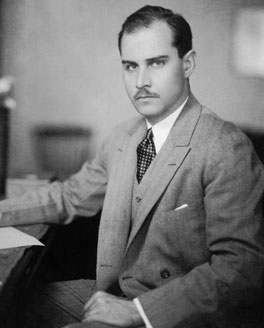Briton Hadden
(editor, media owner) | ||||||||||||||
|---|---|---|---|---|---|---|---|---|---|---|---|---|---|---|
 | ||||||||||||||
| Born | 18 February 1898 | |||||||||||||
| Died | 27 February 1929 (Age 31) | |||||||||||||
| Nationality | US | |||||||||||||
| Alma mater | Hotchkiss School, Yale | |||||||||||||
| Member of | Skull and Bones | |||||||||||||
Co-founder of Time Magazine with Henry Luce, who gained hold of company after Hadden died prematurely in 1928.
| ||||||||||||||
Briton Hadden was the co-founder of Time magazine with his Yale classmate Henry Luce. He was Time 's first editor and the inventor of its revolutionary writing style, known as Timestyle. Though he died at 31, he was considered one of the most influential journalists of the twenties, a master innovator and stylist, and an iconic figure of the Jazz Age.
Founding of Time magazine
In 1923, Hadden and Luce co-founded Time magazine along with Robert Livingston Johnson and another Yale classmate. Hadden and Luce served alternating years as the company's president, but Hadden was the editor for four and a half of the magazine's first six years, and was considered the "presiding genius".
Hadden and Luce used their contacts through the Skull and Bones secret society. A fellow member, Henry Pomeroy Davison Jr., persuaded his father, Henry Pomeroy Davison, a senior partner at J. P. Morgan, the most powerful commercial bank in the United States at the time, to invest money in the magazine.[1]
In 1928 the two men argued about business matters. Henry Luce was keen to publish a second magazine that he wanted to call Fortune. Hadden was opposed to the idea of publishing a journal devoted to promoting the capitalist system. He considered the "business world to be vapid and morally bankrupt".[1]
Death
Wikipedia reports that "In December 1928, Hadden became ill. He died two months later, most likely of streptococcus viridans, which had entered his bloodstream, causing septicemia and ultimately the failure of his heart. Before he died, Hadden signed a will, which left all of his stock in Time Inc. to his mother and forbade his family from selling those shares for 49 years. Within a year of Hadden's death, Luce formed a syndicate, which succeeded in gaining hold of Hadden's stock."
Henry Luce visited Hadden every day at the hospital. He later recalled: "The last time or two that I was there, I guess I knew he was dying and maybe he did. It seemed to me that he knew and every now and again was wanting to say something, whatever it might be he wanted to say in the way of parting words or something. But he never did, so that there was never any open recognition between him and me that he was dying."[1]
Luce took Hadden's name off the masthead of Time within two weeks of his death. In the next 38 years, he delivered more than 300 speeches around the world, mentioning Hadden four times. Luce acquired control of Hadden's papers, and he kept them at Time Inc., where no one outside the company was allowed to view the papers as long as Luce lived. Throughout his life, Luce repeatedly claimed credit for Hadden's ideas in public speeches and in Time magazine.[2]